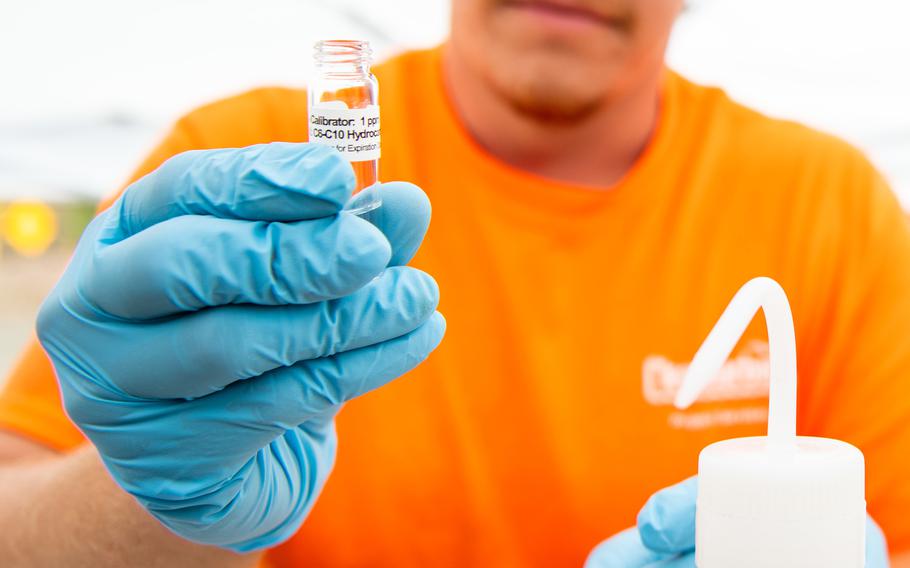
A Navy contractor tests a water sample as part of real-time monitoring at the Navy’s Red Hill well in Aiea, Hawaii, in April 2022. (Mar’Queon A.D. Tramble/U.S. Navy)
FORT SHAFTER, Hawaii — The University of Hawaii announced Monday it had begun pre-enrollment in its Red Hill Registry, which is intended to provide support and resources for those impacted by the Navy’s 2021 jet fuel spill on Oahu.
Those wishing to pre-enroll will be asked to provide contact information, activities as related to the fuel spill, current location and main concerns they wish the registry to address, the university said in a news release Monday.
Enrollment is open to anyone affected by the spill regardless of a connection with the military.
A form to pre-enroll is at www.RedHillRegistry.org. Full enrollment is expected to begin this summer.
The registry, operated by the university’s Office of Strategic Health Initiatives project, is being funded by a five-year, $27.2-million federal grant from the National Center for Disaster Medicine and Public Health at the Uniformed Services University of the Health Sciences.
The registry will also track and study the health status of participants over time in order gain greater understanding of long-term effects from jet-fuel exposure.
A spill in November 2021 from the Red Hill Bulk Fuel Storage Facility, located a few miles from Joint Base Pearl Harbor-Hickam, contaminated one of three wells used by the Navy for its water distribution system for military communities on and near the joint base.
Thousands of residents were temporarily relocated during the following months as the Navy sealed off the system from the contamination and flushed the pipes.
Many residents, however, consumed and bathed in the tainted water in the wake of the contamination. Some complained of rashes, headaches, nausea, dizziness and vomiting.
Hundreds have joined a lawsuit in federal court seeking compensation. The trial for the first 17 “bellwether” plaintiffs in the civil suit Feindt vs. United States took place in May in Hawaii. U.S. District Court Judge Leslie Kobayashi has not yet issued a decision.
That case, however, underscored the need for better understanding of the long-term effects of human exposure to jet fuel.
During pretrial motions, Kobayashi disallowed expert testimony about long-term illnesses caused by jet-fuel, saying that only animal studies had been conducted.
“Animal studies, standing alone, do not demonstrate that a specific Plaintiff’s exposure to jet fuel caused that specific Plaintiff’s injuries,” Kobayashi wrote in an April 9 order.
Human studies on the effects of jet-fuel exposure are feasible and necessary, according to a report prepared by the University of Hawaii earlier this year under a requirement by the National Defense Authorization Act for fiscal 2024.
“Exposure to jet fuel through the drinking water to the general population is unprecedented and little is known about the potential health effects, particularly in vulnerable populations such as children and pregnant women,” the report states. It was presented Sept. 23 to the Committees on Armed Services of the House and Senate.
Existing studies are too few and too limited in scope to generalize findings, the report states.
“Given the infrastructure that is in development by the Registry, numerous epidemiological studies, including those that are broad in scope or very specific, are indeed feasible following a questionnaire-based or modeling-based exposure assessment,” the report states.